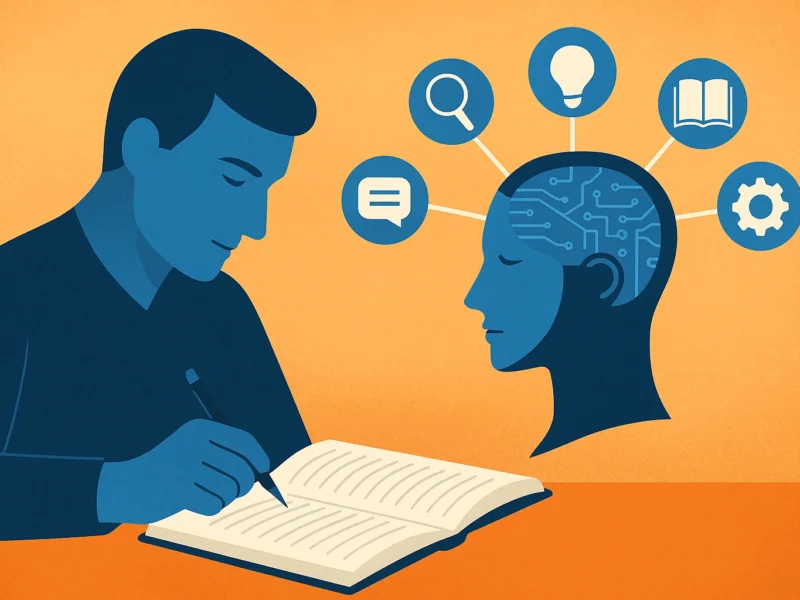The art of writing changes (and it is said that it is an evil)
There was a time when the writing was lonely. Paper, pen and inspiration. Then came the computer, then the software of writing, then editing tools automatic. Today, with the artificial intelligence, we are facing a new turning point the possibility that an algorithm becomes a co-author of a novel, implies textures, styles, developments in the narrative. Is the era of the literature increased.
Who writes today can choose whether to remain single or open your own creative process to the collaboration with a machine. Seems to be a heresy, but is a reality already in place. And while some see this phenomenon as a threat to creativity, others consider it a tool of empowerment, is capable of breaking down the writer's block, and open up new ways of narrative.
But what it really means to write a novel with the AI? Is it still art? You still human?
What is the literature increased?
Literature increased is a form of writing in which the artificial intelligence actively participates in the creative process. It does not replace the author, but of helpas an assistant, which suggests phrases, expand paragraphs, offers stylistic alternatives, generates ideas narrative. Everything from language models such as GPT, which are trained on millions of texts and capable of producing new content that is consistent, fluid, and even original.
The writer is the main author, but it works with the intelligence that “understands” the language, that can be interrogated, stimulated, directed. Creativity does not disappear: it transforms. Becomes dialogue, interaction, continuous choice.
How does the writing artificial intelligence?
Write a TO what it means to work in an environment where every word can be suggested, each idea can be extended, each narrative structure can be reformulated. The author can write a beginning and ask the five continuations different. Can generate a description of the landscape in a poetic style or a dialogue in the style of a thriller. You can use the AI as a lens to creative, filter style, the case of resonance.
Tools such as Sudowrite, Jasper, or even ChatGPT are already used by independent authors and writers. Some use them for the world-building narrative, others to explore alternative styles. In all cases, the AI is an active part of the process, but not the above.
An emblematic example is the news Death of an Author Stephen Marche, published in 2023 under the pseudonym of Aidan Marchine. The book has been written to 95% with the help of artificial intelligence, combining tools such as ChatGPT, Cohere and Sudowrite. This experiment raises profound questions about authorship, authenticity and creativity. He also talked about Wired in an analysis dedicated, available here: “Death of an Author – THE Book Review” on Wired.
What are the impact?
The implications are manifold. On the one hand, literature can become more accessible. Writers, novice can overcome the anxiety of the blank page. Authors with disabilities can get technical support in the drafting. Publishers can evaluate synopsis generated automatically to select the most promising proposals.
On the other hand, open complex issues. Who is the copyright of a work written with the AI? The author or the algorithm? And if the AI plays phrases from pre-existing texts, we are in front of plagiarism? These doubts were raised also in the article of our blog “IA and copyright: The Work is of Who?”, which addresses the node of the intellectual property in the context of the creative productions automated.
Frequently asked questions (FAQ)
AI writes really like a human author?
In part, yes. The texts are often consistent and stylistically correct. But a lack of intention, of experience, of emotion. For this you still need human supervision.
Yet the literature?
Yes, if used as a creative tool and not as an automatic generator of content. The difference is in the manner in which it is integrated into the process.
Can write entire novels?
Technically yes. But without the human intervention, the result is often flat, repetitive, lacking depth narrative.
Readers understand whether a text was written with the AI?
It depends. Often no, but style too generic or repetitive betray the automatic source of the text.
Towards a new form of authorship
Literature increased does not kill the scripture. Expands it. Provides the tools, the stimuli and new ways to think about the stories. But it also poses urgent questions: what it means to be an author today? How has the experience, the personal voice, the intent fiction?
The artificial intelligence can't replace the human sensitivity, but it can become a travel companion. A co-author silent, which stimulates, provokes, he suggests. Like any technology, its value will depend on the use we make of it. And from our ability to remain – however – human, even when we write together in a car.
